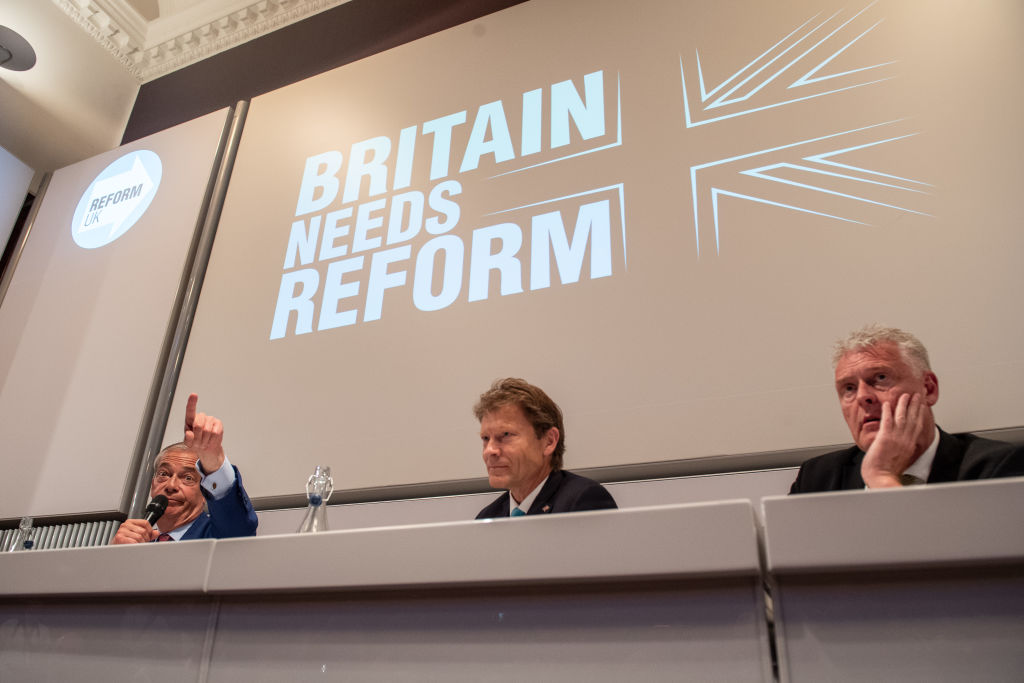Donors of the Reform party are considering creating a partisan think tank in the American style. These plans are subject to change, but it is not looking good. Many Reform backers, it seems, see the proposed institution, named provisionally as ‘Resolute 1850’, as a way to attract American money. Someone like Elon Musk hands over hundreds of millions of dollars to organisations supportive of the Republican party and Donald Trump but remains legally unconnected to them. Reform donors hope that a similar body could be made in Britain. It would attract money that political parties legally cannot gather, from people who might have problems, as Musk appears to do, with Reform’s own leadership, including Nigel Farage.
A new think tank is not itself a bad idea. Britain’s politics could certainly use a good one. Observers might think there are enough of them: they pop up like mushrooms, in little rings. Some concentrate on defence and foreign affairs like Chatham House and Rusi. Others are economics-focused like the Adam Smith Institute and the IEA.
But many are shallow campaign groups, most of them for the Labour party, designed to workshop policy externally. They exist to give the Labour leader of the day, or factions within the party, the ability to say, ‘I read the report with interest and am eagerly considering its recommendations.’ What is often lacking is real thinking – the thing think tanks are supposed to be about.
I worked in a think tank myself (in the European team of the New Lines Institute, a Washington institution). We were small by American standards. Many other think tanks, famous ones like the Brookings Institution and the American Enterprise Institute, have immense reserves of cash and staff. Everything is bigger in America, and that includes staff numbers and budgets. Britain could do, in theory, with some of the same.
But think tanks are only useful if they can do real thinking. This does not appear to be on the Reform agenda. The indications so far suggest it won’t be interested in seriously examining the roots of Britain’s dying economy – its insane housing shortage; its chronic dependency on borrowing; its incessant importing of low-skill, low-wage labour; the growing population of working age people who are not even looking for employment; the crushing ratio of retirees to workers; its inept public services; the illegality of a lot of economic activity and the smothering of the rest beneath tribunals and regulation; the mission creep which has made the Supreme Court and the Net Zero Act the ultimate arbiters of all economic policy; the growing disorder on Britain’s streets.
Reform might notionally gesture towards such things. But the presentation reported on by the Financial Times indicated that the think tank’s first campaign, planned for 2026, could be ‘countering housebuilding’. At a time when Britain has some of the highest rents in the world. When the average Brit must borrow ten times their wage to buy an average home. This is madness.
Knee-jerk nonsense like this would be research in name only, designed to propagate the party’s delusional boomer worldview, one in which housebuilding and ‘net zero’ energy generation are bigger public bugbears than cratering GDP per capita, crime, a lack of prison places and the collapse in birthrates.
Some think tanks, one of them amusingly already called Reform, have done a lot of good work of late on Britain’s economic stagnation. The ‘Foundations’ project, written up by Ben Southwood, Samuel Hughes and Sam Bowman, was intellectually clear and its message was stark. It was widely read in Westminster and its authors visited Downing Street earlier this month. If Labour really wants to grow the economy, it will listen to them.
This is the kind of work that a new think tank of the right ought to do. But ‘Resolute 1850’ does not seem to have that kind of work in mind. Instead, the plan seems to be to raise cash for some men born long ago, who are running out of time – and who have no interest in addressing the things that will doom the country when it is inherited by their children.







Comments